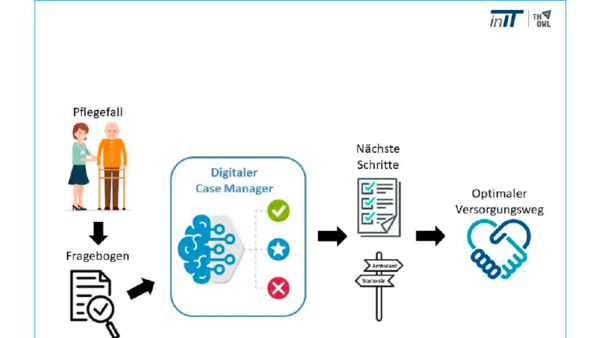In order to optimize the compatibility of care and work and to improve the situation for small and medium-sized enterprises (SMEs) as well as for care-giving employees, the project "work & care" was launched in November 2019. The EU-funded project is scheduled for three years and will be implemented by a competence network under the leadership of the Center for Innovation in the Healthcare Industry OWL (ZIG). In addition to ZIG, the project partners are the Future Office of the district of Lippe, the Institute Industrial IT of the Ostwestfalen-Lippe University of Applied Sciences (inIT), the Bielefeld University of Applied Sciences (InBVG), the Institute Work and Technology (IAT) of the Westphalian University of Applied Sciences, and the Plan G network. The mission of work & care is to develop an innovative support model for small and medium-sized enterprises and caring employees in East Westphalia.
One component of this support model is the intelligent digital case manager, which is being developed for Industry 4.0 and is to be transferred to the health and social care sector. The approach is based on the integration of machine learning and artificial intelligence in the context of nursing care. The model is to be understood as an autonomous digital case manager that requires a one-time data input of a care situation by, for example, a family caregiver and can then process a case autonomously. The system learns from previous care cases (self-learning) to evaluate the current care situation and to establish the connections between care situations and further care steps. The goal is to obtain an orientation for further possible care steps based on the information provided by the family caregiver. The digital case manager is designed as a digital twin that models different care situations in a digital world. The tool is designed in a way that it can process additional data from existing standardized case scenarios on the topics of stroke, dementia, and caregiving in the future, as well as be expanded to include new care scenarios such as Parkinson's disease, diabetes, and the others. It is always learning and is continually optimized.
The basis for the development was provided by other partners in the work & care research network. Researchers at the Bielefeld University of Applied Sciences set out to identify the individual needs and stress factors of employed caregivers and to uncover opportunities for empowerment. To this end, 15 guided interviews were conducted with working people who are caring for a affiliated person. Topics of the interviews are working life, home care, living environment, neighborhood and acceptance of technical support systems. The results will be used to generate recommendations for strategies and solutions to relieve the burden on and support care-giving employees, both in the workplace and in the home context. The focus is on innovative support options, such as the digital case manager, and further digital options for empowerment, which will be implemented in the practical phase of the research project.
The results of the interviews show that digitalization aspects have so far been given little consideration by caregivers as both a burden and a support. Nevertheless, digital solutions were viewed positively across the board and perceived as very helpful. In almost all interviews, the high burdens caused by the bureaucratic and organizational effort were conspicuous. In particular, the lack of information on existing services and the time-consuming search for services and forms were mentioned. The wish was expressed several times that health professionals (e.g., doctors, nursing services) offer more support in this regard and that the bureaucracy be reduced.
In light of these findings, the digital case manager appears to be a useful tool for relieving the burden of informal everyday care and represents a supportive advisory tool for family caregivers. The tool serves as an initial overview in a complex care situation that usually arises suddenly, in order to offer family caregivers a quick way to find their way around and to locate different actors or service providers in the healthcare system. The tool uses a standardized questionnaire to map the current care situation and shows the user possible further care steps. This enables the user to get an overview of the next steps that could be considered for them, and which care services are possible. The digital case manager can therefore represent a low-threshold offer to help improve the compatibility of the individual care and employment situation.


